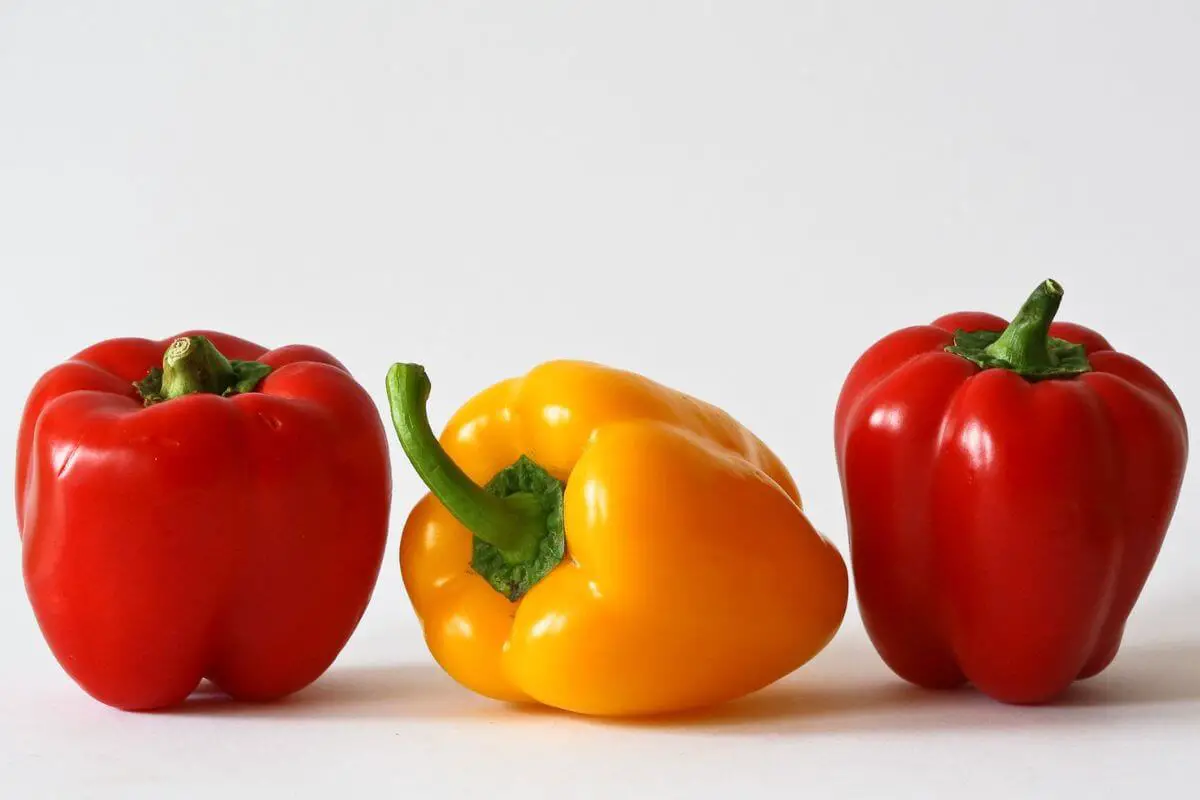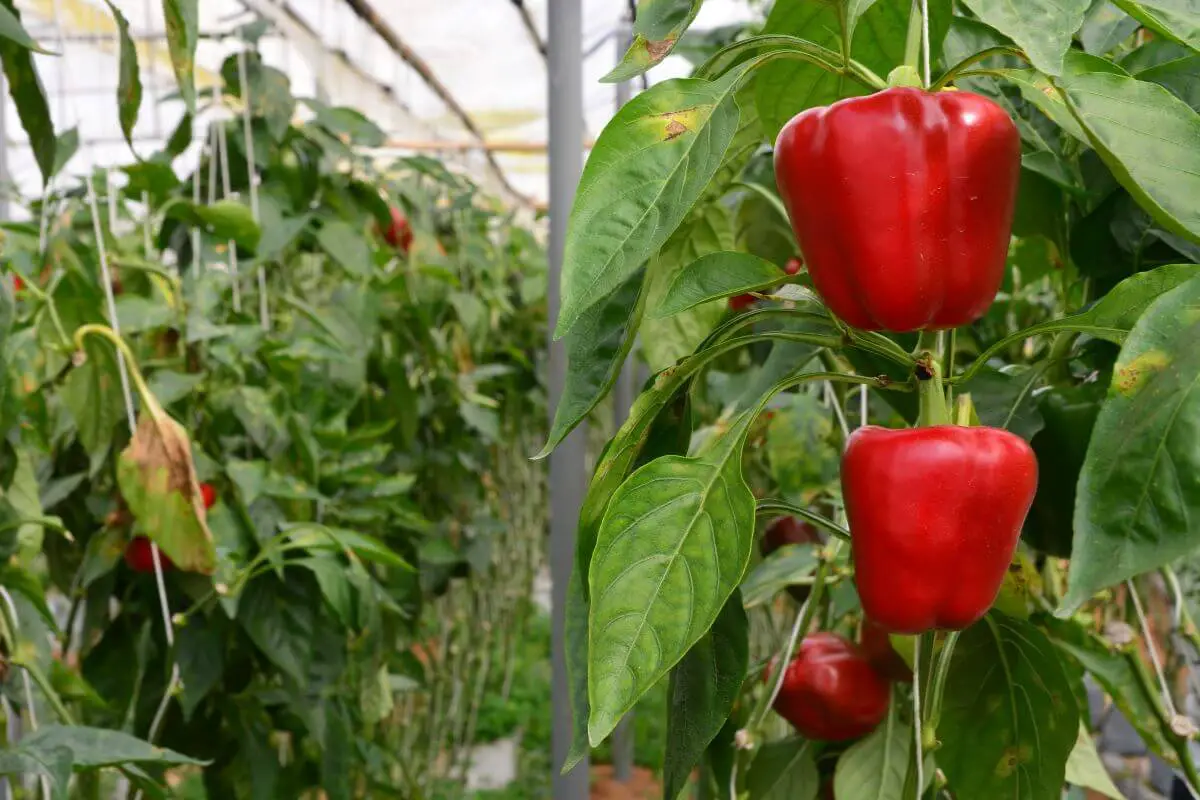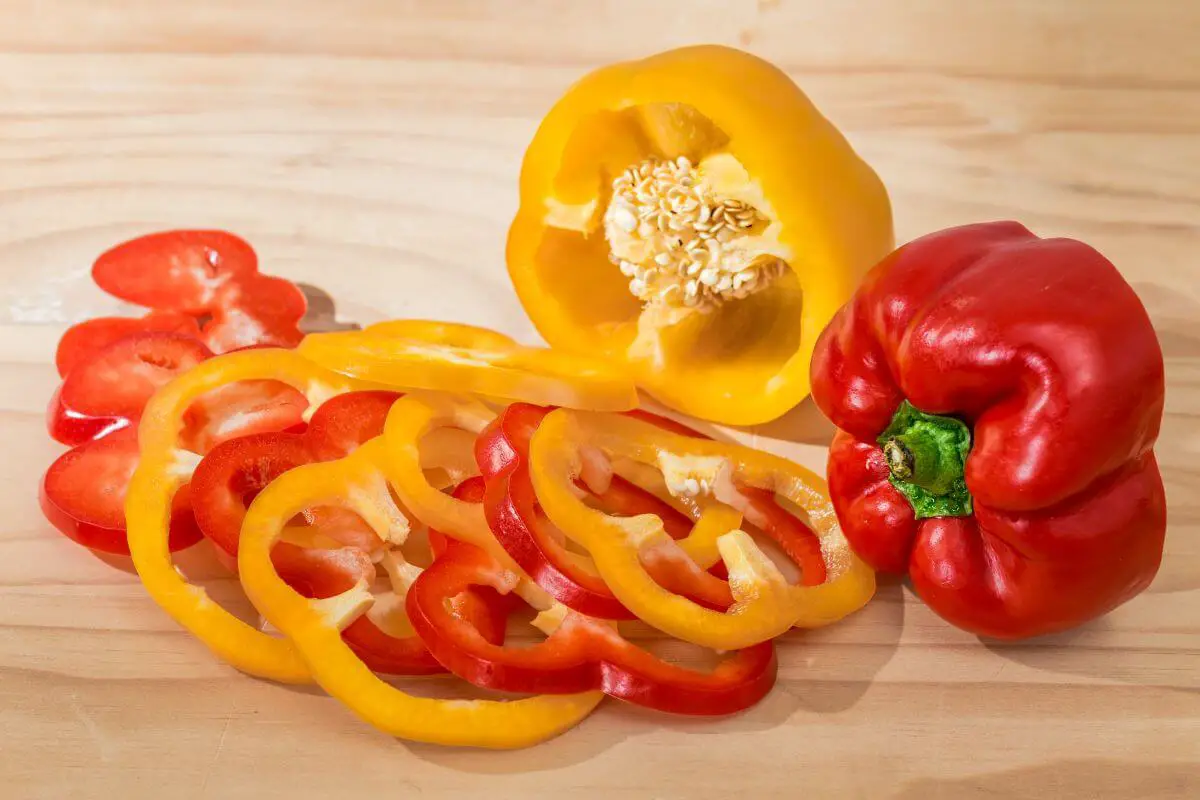Have you ever wondered if bell peppers are fruits or vegetables? You’re not alone. This common question puzzles many, and the answer might surprise you.
I’ll explore both the botanical and culinary classifications of bell peppers. You’ll learn why scientists call them fruits and why chefs treat them as vegetables. I’ll also dive into their history, growth, and health benefits.
Curious to find out more? Keep reading to discover the fascinating details behind bell peppers and settle the fruit vs. vegetable debate once and for all!
- Related article: Comparing Vegetables vs Fruits
5 Key Takeaways on Is Bell Pepper a Fruit or Vegetable?
- Bell peppers are fruits because they grow from the flower’s ovary and have seeds.
- In the kitchen, bell peppers are called vegetables because they are savory and used in cooking.
- Bell peppers change color as they ripen, starting green and turning yellow, orange, red, purple, brown, or white. The color shows how ripe they are.
- The taste of bell peppers depends on the ripeness and other factors, but the number of bumps doesn’t affect the taste.
- Bell peppers are full of vitamins, antioxidants, fiber, and potassium, which are good for your health.
A Brief Overview of the Bell Pepper

Before we dive into why peppers are classified the way they are, let’s learn a bit about them.
Peppers are from the genus Capsicum, a group of flowering plants in the nightshade family, native to Mexico, Central America, and northern South America. They are cultivated worldwide for their chili pepper fruit.
They start as green peppers, which are the most bitter. They change color to yellow, orange, red, purple, brown, or white as they ripen.
Christopher Columbus and Spanish explorers gave peppers their name. They were looking for peppercorn plants to make black pepper.
Unlike spicy peppercorns, bell peppers are sweet. The longer they stay on the plant, the sweeter they get.
Peppers, tomatoes, eggplants, and other fruits and vegetables have “perfect” flowers. This means they have both male and female parts in the same flower.
Why do we have both botanical and culinary classifications for bell peppers? Botanical classification helps botanists. They can discover the origins of peppers, identify different varieties, and learn how to grow and harvest them through these classifications.
On the other hand, the culinary definition emphasizes roles in cooking. If something is more savory than sweet, then it is considered a vegetable from that perspective. They can be cooked or eaten raw and are used in dishes like soups, salads, and side dishes.
Bell Peppers Are Vegetables — Culinary Definition
Most people think of bell peppers as vegetables, and they are right. A ‘vegetable’ is defined by whether or not the plant and its parts are edible. Edible parts can include the roots, stems, bulbs, and leaves.
This is true for bell peppers because of their use in salads (apart from fruit salads), soups, stews, and stir-fries. Professional and home chefs call them vegetables because of how they are used in cooking.
Vegetables have a tougher texture. Fruits are softer. Bell peppers are tough, so they work well in soups, stews, and casseroles.
Fruits are soft. This makes them great for eating raw or using in desserts like pies and ice cream. You can also make smoothies, jams, and sauces with them.
Bell peppers can be eaten raw too. But they are often cooked. This is why they are called vegetables more often.
Culinary classifications do not always match botanical ones.
Bell Peppers Are Fruits — Botanical Definition
The botanical classification of peppers is fruit because they grow from the ovary of a flower and have seeds.
Botany looks at different parts of plants like leaves, stems, flowers, roots, seeds, and more. Each part has traits that help scientists tell plants apart.
A fruit has an ovary with seeds. Seeds have DNA from two parents and all the info needed to grow a new plant.
If you cut open a bell pepper, you will see many small seeds inside. You can save these seeds and grow new peppers.
Because of the seeds, botanists call bell peppers fruits. Just like apples and oranges, bell peppers could be part of a fruit salad.
How to Grow and Harvest Bell Peppers

You should harvest bell peppers when they reach the color you like. They can be green, red, or another color. Peppers do not ripen off the plant. Pick them when they look good to you.
Fertilize your bell pepper plants often. Use a fertilizer with lots of phosphorus. This helps you get more peppers. Some gardeners get 12 to 14 peppers per plant in a good year. Others get only 2 to 3 peppers per plant without much fertilization.
White bell peppers start white. You can pick them before they turn red. They taste more like green bell peppers then.
What Are the Health Benefits of Bell Peppers?

There are several health benefits associated with eating bell peppers because they contain many vitamins and antioxidants. Some of these include:
- Antioxidants – These antioxidants protect cells against damage caused by free radicals. Free radicals cause cell damage when they react with other molecules within our body. Eating foods rich in antioxidants helps prevent cancer and heart disease.
- Vitamin C – Bell peppers provide vitamin C. Vitamin C plays a role in helping us fight off infections and diseases.
- Fiber – Fibrous vegetables like bell peppers give us fiber. Fiber keeps things moving throughout our digestive tract. Fiber also helps keep blood sugar levels stable.
- Potassium – Potassium is vital for proper kidney functioning and heart health. Kidneys filter waste products from the bloodstream. If potassium levels become too low, kidneys cannot properly remove toxins from the body.
- Vitamin B6 – Vitamin B6 is involved in protein synthesis and energy metabolism. It may play a role in preventing certain types of cancers.
- Vitamin E – Vitamin E protects cell membranes from oxidative stress. Oxidative stress occurs when reactive chemicals called free radicals attack cell walls. The result is that the cell wall breaks down and eventually leads to death. Antioxidant nutrients such as vitamin E help reduce the risk of developing chronic conditions like cardiovascular disease and some forms of cancer.
- Calcium – Calcium is required for bone growth and maintenance. It also assists in muscle contractions.
- Potassium – Potassium is vital for proper kidney functioning and heart health. Kidneys filter waste products from the bloodstream. If potassium levels become too low, kidneys cannot properly remove toxins from the body. This results in high amounts of sodium being excreted in urine. High salt intake increases the chances of having hypertension.
- Vitamin A – Vitamin A aids vision development and immune system function. It’s important for healthy skin and mucous membrane tissue.
Male or Female Bell Peppers and Other Facts
You might have heard that female bell peppers have 4-5 lobes and taste sweeter than male bell peppers with only 3 lobes. But is that true?
There is no such thing as a male or female pepper fruit!
Bell peppers do not have genders. The idea of male and female bell peppers is a myth. Each pepper is just a fruit with seeds and does not show any gender or taste difference based on the number of bumps or sections.
| Topic | Fact |
|---|---|
| Gender of Bell Peppers | Bell peppers don’t have genders. They grow from flowers with both male and female parts. |
| Taste Differences | No taste difference between peppers with three or four bumps. Taste varies due to ripeness, water content, or genetics. |
| Color Varieties and Preferences | Bell pepper color (green, yellow, orange, red) indicates ripeness, not gender. Green peppers are unripe, while red, yellow, and orange are more mature. Taste preferences vary: green peppers are mildly sweet, while red, yellow, and orange are sweeter. |
Bell Peppers Are Both Fruits and Vegetables Final Thoughts
Bell peppers are both fruits and vegetables. They grow from a flower’s ovaries and have seeds, which make them fruits. But we call them vegetables in cooking because they taste savory. You can eat them raw or add them to salads, soups, and stews.
Bell peppers are full of vitamins. They have lots of vitamin C, B6, potassium, antioxidants, and fiber. This means they not only taste good but also boost your health.
No matter how you classify them, you should grab some bell peppers on your next trip to the grocery store.
Bell Peppers Are Both Fruits and Vegetables FAQs
1. Is Chili a Fruit?
Chilli peppers are classified as fruits in botany. They develop from the ovary of a flower that has been pollinated, have several layers of flesh, and when mature, contain seeds. These characteristics collectively define them as fruits.
2. Are Jalapenos Fruits?
Jalapenos are considered peppers and that makes them fruits in botanical terms.
3. Is Pickle a Fruit?
Pickles are cucumbers have been seasoned and preserved in vinegar. Cucumbers are botanically ‘fruits’ and culinarily ‘vegetables.’
Learn and compare fruits vs vegetables with these related articles:


